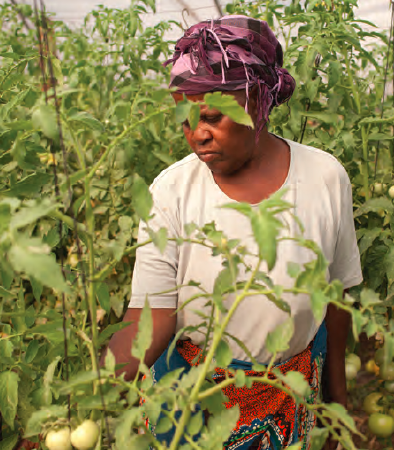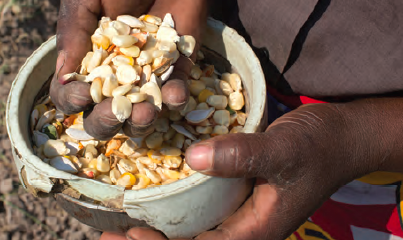Unlocking Zambia’s Agricultural Potential for Nutrition Development
 William Chilufya
William Chilufya
William Chilufya is a civil society advocate with 9 years of experience in championing pro poor development in Zambia. He is leading the Zambia Civil Society Scaling Up Nutrition Alliance (CSO-SUN Alliance) advocacy agenda in Zambia.
Introduction
Zambia has one of the highest rates of childhood undernutrition in the world. In 2014, stunting was reportedly 40% and wasting 6%, alongside high levels of micronutrient deficiencies: 53% of school-aged children are deficient in vitamin A while 46% have iron deficiency anemia (Zambia Demographic Health Survey, 2014).
The Government of Zambia recognizes the problem of undernutrition and has committed to take steps to improve the nutrition situation. In 2011, Zambia joined the Scaling Up Nutrition Movement (SUN), which has fostered the development of a national plan for nutrition that provides a strong foundation for addressing nutrition holistically. As a part of this, the National 1000 Days Programme was developed which focuses on preventing stunting in the first 1000 days of a child’s life. This programme has several components including 1) the provision of nutrition supplements (including iron, folic acid, multiple micronutrients, zinc for diarrhea) for specific vulnerable groups, 2) promotion of complementary feeding, breastfeeding, safe water and sanitation, 3) expansion of the integrated management of acute malnutrition and 4) development of nutritional sensitive activities and messages in social cash transfers and programmes.
The programme brings together five line Ministries including the Ministry of Agriculture and Cooperatives (MoAC); Ministry of Community Development, Mother, and Child Health; Ministry of Health, Ministry of Education and the Ministry of Local Government and Housing. To support this national commitment to nutrition, within the MoAC the 2015 budget has been expanded to include new budget lines to support scaling up nutrition initiatives within the Agriculture sector. Activities funded under these new lines aim to support 1) promotion of dietary diversity for pregnant and lactating mothers and 2) improving the availability of diverse, locally available and processed foods with a focus on women’s empowerment'.
While these efforts are significant and positive, maize still remains the focus of the Zambian diet and economy. Although maize provides some nutrients and calories, alone it lacks the variety of nutrients essential for healthy growth and development. In order for Zambia to respond appropriately to the overall problem of undernutrition, the country needs, and has begun to, reform its agriculture policy- in particular the Farmer Input Support Programme (FISP) and the Food Reserve Agency (FRA).
Agriculture policy
The heavy reliance on maize has been fostered by Zambia’s agricultural policy, particularly through the FISP, which is a national programme that seeks to improve household and national food security, incomes, and accessibility of agricultural inputs to small-scale farmers through a government subsidy. FISP also aims to build the capacity of the private sector to supply agricultural inputs. Working alongside the FISP is the FRA, a national agency, whose main purpose is to ensure national food security and income of farmers by maintaining a sustainable national strategic food reserve. The FRA also acts to stabilize the economy based on national agriculture production. Both the FISP and FRA primarily focus on maize as the countries predominant staple crop.
Agriculture policy reforms: what is needed
Since 2010, the Government has taken small steps to diversify the FISP programme to include diverse crops and livestock. Rice was added in 2010/11, and sorghum, cotton, and groundnuts were added in 2012/13 as part of the former President’s push for crop diversification.
The Civil Society Scaling Up Nutrition Alliance (CSO-SUN) argues that the agriculture sector is accountable not only for producing nutritious foods, but for stimulating demand for a diversified diet. A deliberate agriculture policy that supports diversification of agriculture (increase in production of a range of vegetables, fruits and small livestock) is crucial to increase nutrition security in Zambia.
CSO-SUN proposes that FISP reforms should address and include improved storage, processing, distribution and retail systems to support the production of a range of agricultural products and the consumption of a diversified diet. Small-holder farmers should be able to (and have access to necessary equipment) process the produce they have in order to maintain the nutrients, preserve produce, and reduce seasonal surplus and crop losses. Reforms should also address food safety risks such as aflatoxins.
Furthermore, it is recognized that gender is a fundamental component linking agriculture to improved nutrition. CSO-SUN is advocating to the Government that the National Agriculture Policy, and the FISP in particular, explicitly include improvement in women’s knowledge, skills, productivity and decision making power within the households in the objectives of the policies. Additionally, CSO-SUN suggests that a targeting strategy which includes how vulnerable groups, including pregnant women and women with children under five years of age, can access FISP as these are the groups most vulnerable to undernutrition. This strategy would foster empowerment of women who continue to face discrimination and often have less access to power and resources, including those related to nutrition.
 Conclusion
Conclusion
The CSO-SUN Alliance is willing and able to partner with the Government to support agriculture reforms and ensure that there is a clear focus on improving nutrition through agriculture, food and nutrition policy. There is great potential for stakeholders to work together to unlock the agriculture sector’s potential to help address undernutrition and make Zambia more food and nutrition secure.

